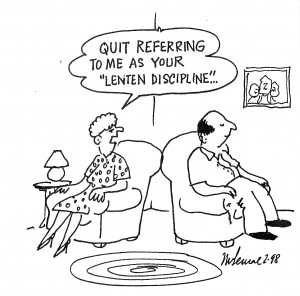Spring Ahead!
Don’t forget to set your clocks ahead one hour this weekend!
Men’s Breakfast
Saturday, March 7th at 8:00 a.m. at Kim & Patty’s
Thoughts from Lori
Can you name the Ten Commandments? The reading from the Hebrew Scriptures this coming Sunday will be from Exodus 20 – the giving of the Ten Commandments. Do you know which one is the longest; the one with the most detailed exhortation? It’s the fourth one: “Remember the sabbath day, and keep it holy.” It ends with, “..the Lord blessed the sabbath day and consecrated it.” Along with the other nine Commandments, this is not a request. It’s a mandate, an order, a charge. Do this! [Exodus 20:1-17]
But by and large, we’ve lost the sense of keeping sabbath. People in the ancient world of Palestine lived lives of basic subsistence; that is, their survival depended on daily labor, either theirs or their servant/slaves. And note that the command to keep a day of rest applied to their slaves as well; even the cattle and such! So while we tend to think of sabbath time as rest, which it is, of course, it was more than that. To take time away from the daily work of providing for their necessities represented their ultimate trust in God to ensure their survival.
We’ve not only lost that sense of sabbath as trusting in God’s providence, we’ve lost any identification with a day that is Sabbath. Originally, it was Saturday, the seventh day. But after Jesus, and after his death and resurrection on the third day – Sunday – that became the holy day for Christians. And for hundreds of years, Sunday was kept as the Christian Sabbath. That is, until very recent times.
Even as recently as my childhood – granted, several decades ago – stores were closed on Sundays, as were movie theaters, and most restaurants. We went to church in the morning, and in the Baptist Church, we went again Sunday evening. In between, we had a family dinner and some pretty genuine time of rest and play. Then, as I was growing up, all that slowly changed. Stores would open for a few hours on Sunday afternoon, restaurants began serving Sunday dinner, and the flood gates opened.
But rather than waste time lamenting a bygone era, our energy would be better spent on reconsidering the meaning of sabbath and how to reclaim it. Here are some things to ask yourself:
Do I make time to truly rest, to regenerate, and to refresh my body, soul, and mind? If not, what prevents me from doing that? Can I embrace the benefits to be gained and find a way to have a regular, sacred, set-apart time for a true sabbath? Can I trust God to provide for my needs – even time enough for what is really important?In our contemporary age, keeping sabbath time is a challenge, isn’t it? But, I believe, one it would behoove us (as my second grade teacher used to say) to pursue. May God bless us with the will and wisdom to keep this Commandment.
Faithfully,
Lori +
Coffee & Conversation
We’re continuing our casual study of the Old Testament book of Job. No prerequisites! All are welcome to this opportunity for rich discussion and conversation.
On the Calendar
Women’s Wednesday – Tonight, 7:00 p.m. Men’s Breakfast – Sat., March 7, 8:00 a.m. Vestry – Thursday, March 19, 7:00 p.m. Vestry Day – Saturday, March 21Holy Week
Palm Sunday – March 29 Holy Monday service – March 30, 7:00 p.m. Holy Tuesday service – March 31, 7:00 p.m. Holy Wednesday service – April 1, 7:00 p.m. Maundy Thursday – April 2, 7:00 p.m. Good Friday – 9:00 a.m., 7:00 p.m. Easter Sunday – April 5Lessons and Hymns for Sunday, March 8th
(Third Sunday in Lent – Year B)
by the Rev. William McLemore
THE SCRIPTURE LESSONS:
The First Reading: Exodus 20:1-17. Here, we have the Ten Commandments with additional commentaries on portions of it.
The Psalm: Psalm 19. Here we find a celebration of God’s law: “The law of the Lord is perfect and revives the soul.”
The Epistle: I Corinthians 1:18-25. Paul discusses the importance of the symbol of the Cross of Christ and the crucifixion which is folly to the unbeliever but spiritual health to those of faith.
The Gospel: John 2:13-22. Jesus goes to Jerusalem near the Passover and finds people selling animals and money changes in the temple, saying, “Stop making my Father’s house a marketplace!”
THE HYMNS:
Processional Hymn: No. 372. “Praise to the Living God.” This hymn was written by Thomas Olivers and is based on an ancient Jewish creed called the “Yigdal.” It has thirteen articles that praise God in every way imaginable. Translated into English, it begins with these words, “Extolled and praised be the living God, who exists unbounded by time.” The tune was written by a Jewish cantor, Meyer Lyon, thus the name, “Leoni.”
Sequence Hymn: No. 628. “Help Us, O Lord, to Learn the Truths.” This hymn was written by William Watkins Reid, Jr. (1923-2009), who earned degrees from Oberlin in 1945 and 1947, and then obtained a degree from Yale Divinity School. He served the Methodist Church not only in local parishes but also through his involvement in annual conferences and membership on various commissions and boards of that denomination. The hymn extols the benefits of studying Holy Scriptures and therefore is in this section of our hymnal. The tune, “St. Ethelwald,” was composed by William Henry Monk (1823-1889).
Presentation Hymn: No. 495. “Hail, Thou Once Despised Jesus.” This hymn is one which praises Jesus in his various roles: Galilean King, Universal Savior, Paschal Lamb, God Appointed, Reconciler, Intercessor, and the Emmanuel. The original composition is ascribed to John Blakewell (1721-1819) with later adaptations by Martin Madan (1726-1790). The tune, “In Babilone,” is a traditional Dutch melody. When the 1906 hymnal was being produced, the hymn was harmonized by Ralph Vaughan Williams (1872-1958) and has been in our hymnals since.
Communion Hymn: No. 325. “Let Us Break Bread Together.” This hymn is new to the Episcopal 1982 Hymnal though not to other older Christian hymnals. It is an African-American spiritual in both words and music revealing a deep appreciation for the two elements of the Holy Eucharist-the bread and the wine. (This hymn will be the Communion Hymn throughout Lent.)
Recessional Hymn: No. 524. “I Love Thy Kingdom, Lord.” This hymn was authored by Dr. Timothy Dwight (1725-1817) when he was president of Yale College. It is based on Psalm 137 and has been in the Episcopal hymnals since 1826. The tune, “St. Thomas,” was composed by Aaron Williams (1731-1776) and later harmonized by Lowell Mason (1792-1872).
March 8th Servants
Usher: Bill Lang Lector: Jill Harrison Intercessor: Terry Jaworski Eucharistic Ministers: Charlie Boak, Deb Lang Vestry Person of the Day: Bev Jannotta101 Reasons to be an Episcopalian
Reason 53
“Prayer that is time tested.”
Cynthia McLeod, Diocese of East Tennessee
From the cartoons created by the Rev. William P. McLemore
1965 – 2014


